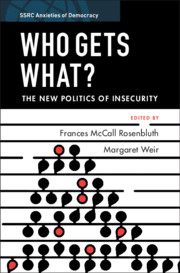Book contents
- Who Gets What?
- SSRC Anxieties of Democracy
- Sponsored by the Social Science Research Council
- Who Gets What?
- Copyright page
- Contents
- Figures
- Tables
- Author Biographies
- Acknowledgments
- 1 Introduction
- Part I People
- 2 Race, Remembrance, and Precarity
- 3 The End of Human Capital Solidarity?
- 4 Public Opinion and Reactions to Increasing Income Inequality
- 5 Engendering Democracy in an Age of Anxiety
- Part II Places
- Part III Politics
- Index
- References
5 - Engendering Democracy in an Age of Anxiety
from Part I - People
Published online by Cambridge University Press: 20 August 2021
- Who Gets What?
- SSRC Anxieties of Democracy
- Sponsored by the Social Science Research Council
- Who Gets What?
- Copyright page
- Contents
- Figures
- Tables
- Author Biographies
- Acknowledgments
- 1 Introduction
- Part I People
- 2 Race, Remembrance, and Precarity
- 3 The End of Human Capital Solidarity?
- 4 Public Opinion and Reactions to Increasing Income Inequality
- 5 Engendering Democracy in an Age of Anxiety
- Part II Places
- Part III Politics
- Index
- References
Summary
This chapter notes the challenge of maintaining and building a democratic politics in the face of increasing inequality and the power of capital over the political process. It argues that among the main proponents of democracy, organized women have been increasingly effective in achieving inclusion in the polity. Historically, they have done so by advocating solidaristic goals rooted in the social good, rather than by focusing on individual success. While the advent of free market economics in the 1970s created divisions among them, there is evidence that in the early twenty-first century, women may once again be unifying around an egalitarian politics that will help to sustain a rising democracy.
- Type
- Chapter
- Information
- Who Gets What?The New Politics of Insecurity, pp. 103 - 126Publisher: Cambridge University PressPrint publication year: 2021



